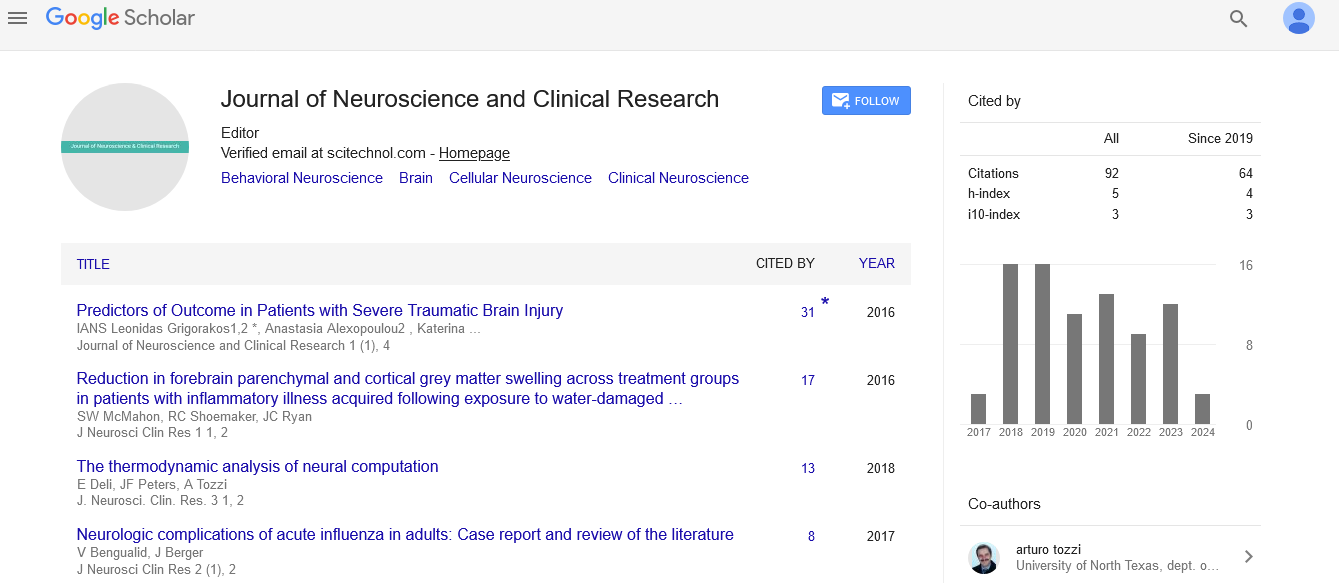Perspective, J Neurosci Clin Res Vol: 8 Issue: 4
Alzheimer's Maze: From Origins to Advancements in Understanding and Treatment
Pericak Thaieke*
1Department of Neuroscience and Mental Health, The University of Melbourne, Melbourne, Australia
*Corresponding Author: Pericak Thaieke,
Department of Neuroscience and
Mental Health, The University of Melbourne, Melbourne, Australia
E-mail: pthaieke@gmail.com
Received date: 24 November, 2023, Manuscript No. JNSCR-24-124050;
Editor assigned date: 28 November, 2023, Pre QC No. JNSCR-24-124050 (PQ);
Reviewed date: 14 December, 2023, QC No. JNSCR-24-124050;
Revised date: 21 December, 2023, Manuscript No. JNSCR-24-124050 (R);
Published date: 28 December, 2023, DOI: 10.4172/Jnscr.1000177
Citation: Thaieke P (2023) Alzheimer's Maze: From Origins to Advancements in Understanding and Treatment. J Neurosci Clin Res 8:4.
Description
Alzheimer's disease stands as a formidable challenge in the realm of neurodegenerative disorders, affecting millions worldwide and deeply impacting the lives of those diagnosed and their families. This manuscript, "understanding Alzheimer’s disease: unraveling the layers of a complex challenge," delves into the intricate landscape of Alzheimer’s, exploring its origins, progression, impact on individuals, and current advancements in research and care.
The roots of Alzheimer’s disease
Alzheimer's disease, named after Dr. Alois alzheimer who first described it in 1906, is a progressive brain disorder that slowly destroys memory, thinking skills, and the ability to carry out simple tasks. This chapter provides an overview of the historical context, examining the initial discoveries that paved the way for our current understanding of alzheimer's.
The neurological symphony: How alzheimer's unfolds
At the heart of alzheimer's is the gradual deterioration of brain cells, leading to the formation of plaques and tangles-hallmarks of the disease. This chapter explores the intricate process of neurodegeneration, shedding light on the biological underpinnings that contribute to the cognitive decline characteristic of alzheimer's.
Unraveling risk factors and genetics
While age is the primary risk factor for alzheimer’s, this chapter delves into the various genetic and environmental factors that may contribute to an individual's susceptibility to the disease. Understanding these risk factors provides valuable insights into potential preventive measures and personalized treatment approaches.
The impact on individuals and families
Beyond the physiological aspects, alzheimer's has profound emotional, social, and economic implications for individuals and their families. This chapter examines the emotional toll of witnessing a loved one's cognitive decline, the challenges of caregiving, and the societal impact of an aging population affected by alzheimer's.
Diagnostic challenges and early detection
Diagnosing alzheimer's disease can be complex, with definitive confirmation often possible only through post-mortem examination. This chapter explores the challenges in diagnosing alzheimer's and the importance of early detection, emphasizing the role of emerging diagnostic technologies and biomarkers in improving accuracy.
Current treatments and therapeutic approaches
While there is currently no cure for alzheimer's, this chapter explores existing treatments and therapeutic approaches aimed at alleviating symptoms and enhancing the quality of life for individuals with the disease. It also highlights the ongoing research into potential disease-modifying treatments that could alter the course of alzheimer's.
Lifestyle interventions and alzheimer's prevention
A growing body of research suggests that certain lifestyle interventions may influence the risk of developing alzheimer's. This chapter investigates the impact of factors such as diet, exercise, cognitive engagement, and social connections on brain health, offering practical insights for individuals seeking to reduce their risk.
Advances in alzheimer's research
This chapter provides a glimpse into the latest advancements in alzheimer's research, including breakthroughs in understanding the disease's mechanisms, the exploration of novel therapeutic targets, and the development of innovative diagnostic tools. Highlighting promising avenues, it instills hope for future breakthroughs in alzheimer's treatment and prevention.
Navigating alzheimer's care: A holistic approach
Caring for individuals with alzheimer's demands a holistic approach that considers not only the medical aspects but also the emotional and psychological well-being of both the affected individuals and their caregivers. This chapter explores strategies for providing compassionate and effective care, emphasizing the importance of support networks and community resources.
Conclusion
"Understanding alzheimer's disease: unraveling the layers of a complex challenge" concludes with a resounding call to action. Alzheimer's disease, with its far-reaching impact on individuals, families, and societies, demands our collective attention and commitment. The journey through the intricacies of alzheimer's has revealed not only the scientific challenges but also the profound human experiences that accompany the disease. As we stand at the intersection of medical advancements, societal aging, and the emotional complexities of caregiving, it becomes clear that a multifaceted approach is essential. From fostering awareness and understanding in communities to supporting ongoing research initiatives, every contribution is a step forward in the battle against alzheimer's.
The road ahead may be daunting, but the stories of resilience, the strides in research, and the potential for breakthroughs offer glimpses of hope. This is a call for governments, healthcare professionals, researchers, caregivers, and communities to unite in the pursuit of solutions-from improved care strategies to the elusive quest for a cure. It is a call for compassion and empathy, recognizing the human faces behind the statistics and understanding that each individual affected by alzheimer's has a unique story, a lifetime of memories, and an enduring spirit. In conclusion, "understanding alzheimer's disease" is not just a journey through the scientific intricacies of a complex disorder; it is an invitation to join hands in the collective effort to alleviate the burden of alzheimer's. By working together, we can advance research, enhance care, and ultimately strive for a world where the impact of alzheimer's is minimized, and individuals facing this challenge are supported with dignity, compassion, and a profound sense of community. The journey does not end here; it extends into the hearts and actions of those who choose to make a difference in the face of alzheimer's.
 Spanish
Spanish  Chinese
Chinese  Russian
Russian  German
German  French
French  Japanese
Japanese  Portuguese
Portuguese  Hindi
Hindi 